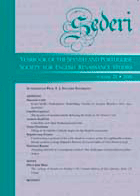
Sederi 25
Sederi 25 — 2015
EDITORS
Berta Cano Echevarría & Ana Sáez-Hidalgo
REVIEW EDITOR
Francisco J. Borge López
ISSN 1135-7789
Camilla Caporicci, “The tyranny of immaterialism: Refusing the body in The Winter’s Tale.” SEDERI 25 (2015): 31-54.
DOI: https://doi.org/10.34136/sederi.2015.2 Download PDF
Abstract
The aim of this study is to analyse the way Shakespeare’s work reveals the failure – in both private and public lives – of a system of thought in which the body is construed as a mere receptacle of immaterial and “superior” entities, supposedly governed by rational kinds of political and social power. After a brief consideration of Measure for Measure as a play focused on the political danger of denying the material aspect of the individual, The Winter’s Tale will be seen as presenting a similar problem. Here, the aspiration to an ideal of absolute purity and the consequent demonization of the sexualized flesh, deriving from both Puritan theology and neo-Platonic philosophy, merges with the anxiety towards the “rebellious” body fostered by sixteenth century medical science, constituting the disruptive force that initiates the plot. This attitude of denial of the body, linked to political power, leads to both a psychological breakdown and, in the public sphere, to a regime of tyranny.
Keywords: Shakespeare; Renaissance philosophy; Renaissance medical science; Puritanism; Body; Sexuality; Machiavelli; Tyranny; Measure for Measure; The Winter’s Tale.
References
Bakhtin, Mikhail 1993 (1965). Rabelais and His World. Trans. Hélène Iswolsky. Bloomington: Indiana University Press.
Barker, Francis 1984. The Tremulous Private Body: Essays on Subjection. London: Methuen.
Betussi, Giuseppe 1968 (1544). Il Raverta. Ed. Giuseppe Zonta. Trattati d’amore del Cinquecento. Bari: Laterza.
Caporicci, Camilla 2013. The Dark Lady. La rivoluzione shakespeariana nei Sonetti alla Dama Bruna. Passignano s.T.: Aguaplano.
Del Sapio Garbero, Maria 2003. “Plica Ex Plica: Ermione e Perdita.” Eds. Viola Papetti and Nancy Isenberg. Le Forme del Teatro. La Posa Eroica di Ofelia. Roma: Edizioni di Storia e Letteratura: 25-53.
DiGangi, Mario 1993. “Pleasure and Danger: Measuring Female Sexuality in Measure for Measure.” ELH 60/3: 589-609.
Elam, Keir 1996. “In What Chapter His Bosom?: Reading Shakespeare’s Bodies.” Alternative Shakespeares, Vol 2. Ed. Terrence Hawkes. London: Routledge: 140-63.
Enterline, Lynn 2000. “‘You speak a language that I understand not’: the rhetoric of animation in The Winter’s Tale.” The Rhetoric of the Body from Ovid to Shakespeare. Cambridge: Cambridge University Press: 198-226.
Esposito, Roberto 2010. Pensiero vivente. Torino: Einaudi.
Ficino, Marsilio 1962 (1576). Theologiae Platonicae, de immortalitate animorum. In Opera Omnia. Torino: Bottega d’Erasmo.
Fox, Alastair 1997. The English Renaissance. Identity and Representation in Elizabethan England. Oxford: Blackwell.
Gish, Dustin A. and Bernard J. Dobski 2013. “Shakespeare and the Body Politic.” Eds. Dustin A. Gish and Bernard J. Dobski. Shakespeare and the Body Politic. Plymouth: Lexington Books: 1-27.
Hadfield, Andrew 2004. Shakespeare and Renaissance Politics. The Arden Shakespeare. London: Thomson Learning.
Hamilton, Donna B. 1992. Shakespeare and the politics of Protestant England. Lexington: The University Press of Kentucky.
Hillman, David 2007. Shakespeare’s Entrails: Belief, Scepticism and the Interior of the Body. Houndmills and New York: Palgrave Macmillan.
Hillman, David 1997. “Visceral Knowledge.” Eds. David Hillman and Carla Mazzio. The Body in Parts. Fantasies of Corporeality in Early Modern Europe. New York and London: Routledge: 81-105.
Holland, Norman N. 1959. “Measure for Measure: The Duke and the Prince.” Comparative Literature 11/1: 16-20.
Jardine, Lisa 1989. Still Harping on Daughters: Women and Drama in the Age of Shakespeare. New York: Columbia University Press.
Johnson, Nora 1998. “Ganymedes and Kings: Staging Male Homosexual Desire in The Winter’s Tale.” Shakespeare’s Studies 26: 187-217.
Kantorowicz, Ernst 1957. The King’s Two Bodies: A Study in Mediaeval Political Theology. Princeton: Princeton University Press.
Laqueur, Thomas 1986. “Orgasm, Generation, and the Politics of Reproductive Biology.” Representations 14: 1-16.
Laqueur, Thomas 1990. Making Sex: Body and Gender from Greeks to Freud. Cambridge, MA: Harvard University Press.
López-Peláez Casellas, Jesús 2004. “The Neo-Stoic Revival in English Literature of the Sixteenth and Seventeenth Centuries: An Approach.” SEDERI Yearbook 14: 93-115.
Luther, Martin 1976 (1515-1516). Commentary on Romans. Trans. J. Theodore Mueller. Grand Rapids: Kregel Publications.
Machiavelli, Niccolò 1976 (1532). Il Principe. Ed. Delio Cantimori. Il Principe e le opere politiche. Milano: Garzanti.
McLaren, Angus 1984. Reproductive Rituals: The Perception of Fertility in England from the Sixteenth Century to the Nineteenth Century. London: Methuen.
Ovid 1995 (2-8 AD). Metamorfosi. Eds. Mario Ramous and Luisa Biondetti. Milano: Garzanti.
Owens, Margaret E. 2005. Stages of Dismemberment: The Fragmented Body in Late Medieval and Early Modern Drama. Newark: University of Delaware Press.
Paster, Gail Kern 1993. The Body Embarrassed. Drama and the Disciplines of Shame in Early Modern England. Ithaca and London: Cornell University Press.
Pico della Mirandola, Giovanni 2004 (1486). Oratio De Hominis Dignitate. Ed. Eugenio Garin. Torino: Nino Aragno.
Rutter, Carol Chillington 2001. Enter the Body: Women and Representation on Shakespeare’s Stage. London and New York: Routledge.
Sanders, Eve Rachelle 2006. “The Body of the Actor in Coriolanus.” Shakespeare Quarterly 57/4: 387-412.
Sawday, Jonathan 1995. The Body Emblazoned. Dissection and the Human Body in Renaissance Culture. London and New York: Routledge.
Schneider, Ben Ross 1993: “Granville’s Jew of Venice (1701): A Close Reading of Shakespeare’s Merchant.” Restoration. Studies in English Literary Culture, 1660-1700 17, 2: 111-35.
Schneider, Ben Ross 1995: “‘Are We Being Historical Yet?’: Colonialist Interpretations of Shakespeare’s Tempest.” Shakespeare Studies 23: 123-45.
Shakespeare, William 2005 (1623). Measure for Measure. Eds. Stanley Wells, Gary Taylor, John Jowett and William Montgomery. The Oxford Shakespeare. The Complete Works. Oxford: Oxford University Press.
Shakespeare, William 2005 (1623). The Tempest. Eds. Stanley Wells, Gary Taylor, John Jowett and William Montgomery. The Oxford Shakespeare. The Complete Works. Oxford: Oxford University Press.
Shakespeare, William 2005 (1623). The Winter’s Tale. Eds. Stanley Wells, Gary Taylor, John Jowett and William Montgomery. The Oxford Shakespeare. The Complete Works. Oxford: Oxford University Press.
Schoenfeldt, Michael C. 1999. Bodies and Selves in Early Modern England: Physiology and Inwardness in Spenser, Shakespeare, Herbert and Milton. Cambridge: Cambridge University Press.
Siemon, James R. 2001. “Between the Lines: Bodies/Languages/Times.” Shakespeare Studies 29: 36-43.
Stallybrass, Peter 1986. “Patriarchal Territories: The Body Enclosed”. Eds. Margaret W. Ferguson, Maureen Quilligan and Nancy J. Vickers. Rewriting the Renaissance: The Discourse of Sexual Difference in Early Modern Europe. Chicago: University of Chicago Press.
Stier, Richard 2011. The Unrepentant Renaissance. Chicago and London: The University of Chicago Press.
